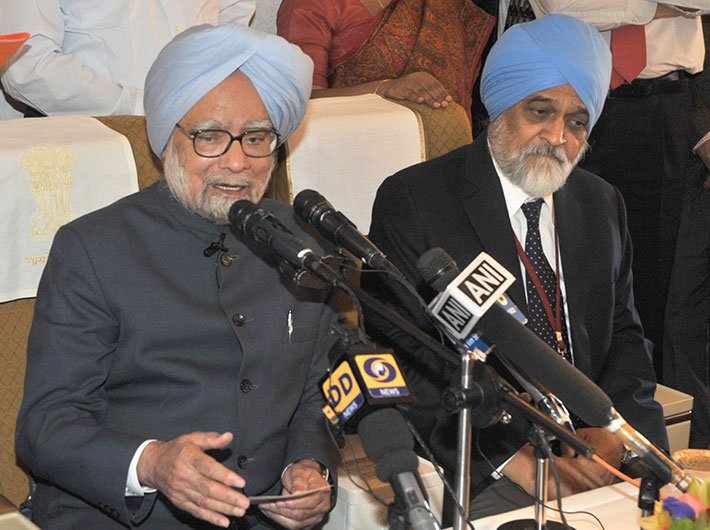With Yojana Bhawan deserted in budget run-up, a look back at what went wrong as plan panel looks set for major changes, if not total shutdown
When Sadananda Gowda presents the railway budget on July 8, it will be the first one since 1950 that the planning commission would have little role in. Suddenly, the Yojana Bhawan, where the commission is housed and which had become extremely powerful under the aegis of its last deputy chairperson, Montek Singh Ahluwalia – a little too powerful for anyone’s good, to believe many critics – lies shorn of financial muscles and say.
Ahluwalia and other members of the commission have resigned and vacated their offices, the financial muscles the panel drew its power from have been passed on to the Arun Jaitley-headed finance ministry.
In a way, as obituaries are being written about the plan panel – and its future discussed, debated and speculated upon – this ushers in the biggest modification in India’s financial marrow since 1950, when Jawaharlal Nehru set up this commission through an executive fiat.
For now, no one quite knows the fate of the commission, even as speculation was rife that it would go under the knife ever since prime minister Narendra Modi assumed office. While Modi has not spoken in public on the commission’s future, minister of state (independent charge) for planning Rao Inderjit Singh has implied to the media that the government is in no hurry to appoint a new deputy chairman of the commission to replace Ahluwalia.
But this is not a Congress versus BJP scrap, for even Manmohan Singh had called for a review of the plan panel’s role in an increasingly open economy in his farewell speech as the prime minister.
For now, while Yojana Bhawan awaits a redirection, most of its past inhabitants agree in unanimity that the planning commission’s functions are more important than the body per se.
“The issue is not whether you want to do away with the body. The issue is where its functions would go. One also needs to ask whether there is a need for coordination mechanism among different functionaries of the government,” says Pronab Sen, former principal advisor to the commission.
Besides its vital role in inter-ministerial coordination, the panel is a key interface between the centre and states. Significantly, while many today point out that the BJP’s election manifesto had indicated at an overhaul, those in the commission appeared super-certain that the 64-year-old institution would carry on – like it has always done after every regime change at the centre, with only a change in the deputy chairman and some members. Even just a year ago Ahluwalia had said that the state annual plan meetings were the only platform where the centre could directly question the chief ministers on progress of development programmes.
Sen says the panel also provides for checks and balances to the finance ministry, which would otherwise be very powerful. A serving advisor (name withheld on request) in the panel says it is “common sense” that revenue generation and resource allocation cannot be a prerogative of the same ministry – finance, in this case. This argument finds favour with several others Governance Now spoke to.
Turf war, ail detection
While the finance ministry and the plan panel would often lock horns on resource allocation in days leading up to the budget, the prime minister, who is the ex-officio chairman of the commission, has had to intervene and douse the fire.
According to commission officials, if the finance ministry itself is tasked with resource allocation for development activities, social programmes will suffer. This is because the primary mandate of the ministry remains generating resources and reining in fiscal deficit, which comes at the cost of social expenditure.
“Stuck in populism, the finance ministry does not look to increase revenue and resorts to tame fiscal deficit by cutting expenditure. This is unhealthy for social upliftment,” says a senior commission official.
While there are other bodies in the government structure to advise the PM – like the national advisory body and the economic advisory body – they are purely advisory in their role. The plan panel, say experts, works across a bigger spectrum – starting from incubating social programmes to roll out to execution down to resource allocation and evaluation.
“It’s an extension of the prime minister’s office itself,” adds Sen, who has worked under five deputy chairmen: Pranab Mukherjee, Madhu Dandavate, Jaswant Singh, KC Pant and Montek Singh Ahluwalia.
So what went wrong with it?
Sudha Pillai, a former member-secretary of the panel, says: “The planning commission crossed its mandate in the last few years. Too many things got added (to its portfolio) and it happened to be entangled in a lot of overarching roles. The panel, thus, got into unnecessary altercations with sister ministries. Rather than (acting as) an advisory body, it turned into an ‘obstructionist ministry’. Some members started acting as de-facto secretaries of other ministries, which resulted in delay of various big-ticket infrastructure projects.”
All this, Pillai says, was unwarranted.
According to Pillai, Delhi Metro’s phase-III was delayed by about 11 months due to the panel’s “over-indulgence”. Similarly, the eastern peripheral expressway connecting national highways of Haryana and Uttar Pradesh bypassing Delhi, also could not take off, the Kerala cadre IAS officer says.
While the commission’s core mandate was to conceptualise five-year plans to give a growth direction to the country, and Jawaharlal Nehru himself regularly briefed the panel and took brief from it on various development issues, it found itself mired in many “distractions” in the last decade under Ahluwalia.
One of the high profile “unnecessary altercations with sister ministries” that Pillai speaks of resulted in an outburst from the then road transport and highways minister Kamal Nath, who once had a caustic dig at the panel, calling it an “armchair adviser” without any accountability and target.
Accusing the planning commission of stopping him from achieving his ambitious target of building 20-km stretches of highways every day, Nath had said, “Producing a book is one thing, while building a road is something different. You collect something from here and there and then produce a book. It’s very well when you are an armchair adviser.”
The national highway authority of India (NHAI) also got into several spats during the tenure of Gajendra Haldea, who was advisor to then deputy chairman Ahluwalia.
“New Sardar in Raisina Hills”
Around the same time the panel was faced with accusations of acting like a corporate lobbyist. Pranab Mukherjee had just become the country’s president and in the absence of a finance minister the who’s who of India Inc walked up the corridors of Yojana Bhawan to resolve infrastructure issues. Among them were Mukesh Ambani, Bill Gates, Analjit Singh (the retrospective tax issue of Vodafone was on at the time), Anil Ambani and top officials of Walmart (the UPA government was then mulling over opening FDI in multi-brand retail).
Ahluwalia was seen as the “New Sardar in Raisina Hills”.
“There must be some instances of this in one’s individual capacity. But in a way it was good, as it got filtered through the panel rather than reaching 7-RCR straightaway,” Sen says.
While inherently the panel’s job was to service development activities, of late it took up the role of economic advisory council of the PM and indulged too much into number crunching, Pillai says. “There were too many economists (in the panel),” she says. “In fact, economists replaced sociologists not only in the plan panel but even in the finance ministry. They worked in an old textbook-ish manner – aloof of the ground reality of rural India,” Pillai said gloomily.
Instead of enacting its role as a ‘planning’ commission, the panel hired consultants and members from global consultancies. An official in the panel says, “The biggest disaster took place in UPA-II when a certain member (who had come from Boston Consulting Group) killed the sanctity of the 12th five-year plan. The mandate of the panel is to set a plausible GDP for the country over the next five years and chart out sector-wise targets to achieve that. Now you are giving three GDP scenarios in the five-year plan. How can you make a mockery of the plan like this?”
Ahluwalia, himself a renowned economist, accepted the format. The official says, “It saved Ahluwalia as an ecnomist. But it killed the objective of the five-year plan. And it killed the relevance of the plan panel in terms of making the 12th plan.”
Those in the know generally agree that the biggest damage to the commission’s reputation came during Ahluwalia’s term – he is said to have run the panel like a global consultancy firm than a socio-planning agency.
According to past commission members like Pillai and Sen, the panel has a socio-economic role to play and is best headed by a hard-nosed politician with knowledge of the grassroots. “It is an interface between states and the centre, and a politician would know the grassroots issues much better than an economist. After all, the panel is a political body; it has to deal with 29 states. A politician would know the nerve of a state and its chief minister better than a technocrat,” Pillai says.
Sen concurs: “politicians deal (with) it better.”
All said and done, the panel’s fate hangs on a cliffhanger for want of answers to several questions:
* Can the executing ministry evaluate its own performance?
* Can states put their record straight themselves?
* Can the ministry responsible for resource generation do justice to social programmes?
* And, who will do the dirty job of inter-ministerial coordination?
BRIEF HISTORY OF THE PLANNING COMMISSION
THEN
Planning commission was set up by a resolution of the union government in March 1950 with a mandate to “formulate a Plan for the most effective and balanced utilisation of the country’s resources; indicate the factors which are tending to retard economic development, and determine the conditions which, in view of the current social and political situation, should be established for the successful execution of the Plan”.
OF LATE
- Over the years, the panel has been under fire from various pillars of the government for going overboard and being an “obstructionist” rather than a facilitator.
- Some critics have mockingly called it the “Control Commission”.
- Under Montek, panel defined poverty line at daily expenditure of '25 per person in villages and '32 per person in urban areas, inviting outrage.
- A joke among journalists covering the commission was that the last village Ahluwalia visited was Gurgaon.
- Earlier, CMs like Narendra Modi and J Jayalalithaa had openly accused it of interfering in federal rights of states.
NOW
- Panel acting without deputy chairman since Montek’s resignation
- Union budget to be presented on July 10, and the rail budget two days before it, without plan panel’s help

